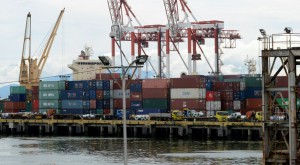Sustaining Customs anti-smuggling agenda
Not much had been heard lately on the activities at the Tincan Island Port of the Nigeria Customs Service since Comptroller Tunji Aremu took over as the area controller of the busy port after serving as controller of Ports and Terminal Multi Services Limited, Apapa. The command with all its challenges however appeared to have performed creditably last year going by the testimonies of Aremu at a recent encounter with journalists. Aremu for instance, revealed that during the period under review, the command in its efforts to combat smuggling, impounded not fewer than 18 goods as a result of false declaration, under declaration. Some, he disclosed were prohibited items.
Lear MoreBrand-conscious, but faking it
KOLKATA: Sambit Chatterjee was wondering what to gift his girlfriend this Valentine’s Day. The second-year college student wanted to impress her with a gift that looked classy but suited his pocket. Sambit’s quest ended on Esplanade pavements when he found a Tommy Hilfiger watch for Rs 1,500! Of course Sambit knew it was fake. But the vendor at the Grand Arcade insisted all watches were ‘original’ and the price was low because they were smuggled into Kidderpore dock. “The only difference is you will not get a warranty certificate,” the vendor explained. The vendor quoted Rs 2,500 but settled for Rs 1,500 after a bout of bargaining.
Lear More
P1-B worth of counterfeit goods seized in Parañaque
MANILA,Philippines-Authoritiesseized P1 billion worth of counterfeit goods, mostly footwear and apparel, from 17 warehouses in Parañaque City Tuesday morning, the National Bureau of Investigation said (NBI). “Halos ito na yata ang pinakamalaki na pinasok ng joint team ng IPO (Intellectual Property Office), Bureau of Customs (BOC) at NBI dahil sa [dami ng] nakita naming mga sako. Parang nationwide operation ito,” lawyer Ruel Lasala, NBI deputy director, told Inquirer Radio 990AM.
(This is the biggest raid conducted by the joint team of the IPO, BOC and NBI because of the amount of goods we saw. It appears to be a nationwide operation.)
http://newsinfo.inquirer.net/576604/p1-b-worth-of-counterfeit-goods-seized-in-paranaque
Lear MoreFederal budget: Tax hikes on cigarettes leave smokers digging deeper
OTTAWA — The federal government is substantially hiking taxes on cigarettes, chewing tobacco and cigars — a move that is sure to leave Canadian smokers doing a slow burn and raises the spectre of increased contraband sales. Even so-called “duty free” tobacco won’t be spared the tax hike announced in Tuesday’s budget: They’ll now face the same federal excise taxes as domestic smokes and manufactured tobacco. The government expects to take in an extra $3.3 billion in revenue from the tobacco tax hikes between now and the 2018-19 fiscal year (including $685 million in the 2014-15 fiscal year starting April 1). The move is sure to spark some ill will towards a government that has promised it would not increase taxes on Canadians, as Ottawa looks to balance the books in 2015, partly on the backs of smokers. Minister of Finance Jim Flaherty and Prime Ministers Stephen Harper enter the House of Commons on budget day on Parliament Hill in Ottawa on Tuesday, February 11, 2014.
Lear More
Counterfeit charge: man’s not guilty plea
A 60-year-old Newnham man pleaded not guilty in the Launceston Magistrates Court earlier today to possessing counterfeit money and putting it into circulation. Geoffrey Keith Turner’s lawyer Evan Hughes asked the matter be dealt with in the Magistrates Court by way of a hearing. The matter was adjourned until May 29 for hearing.
http://www.examiner.com.au/story/2080361/counterfeit-charge-mans-not-guilty-plea/?cs=95
Lear More
Romania: Behind the Smugglers’ Smokescreen
Cigarette smuggling leaves a dent of ten billion euros in the budgets of EU member states. The trafficking is especially rife on the EU’s outer borders. In scarcely any region in the world are cigarettes as cheap as they are in Eastern Europe. Because that’s been the case for years, a veritable smugglers’ paradise has developed. So every night, Romanian customs officials lie in wait with thermal imaging cameras on the border to Ukraine. But it’s not just the customs officials who are getting more professional; so are the smugglers. They even use hang gliders to fly tons of cigarettes to the European Union.
http://www.dw.de/romania-behind-the-smugglers-smokescreen/a-17422276
Lear More
NBA cautions fans to be wary of counterfeit All-Star tickets
With basketball fans from across the country heading to New Orleans this week for NBA All-Star 2014 on Sunday, Feb. 16, at New Orleans Arena, the National Basketball Association (NBA) has cautioned unsuspecting fans against counterfeiters attempting to sell unauthorized and poorly made knock-off merchandise. Counterfeiters not only victimize legitimate retailers in the New Orleans area, they also take advantage of basketball fans who believe they are purchasing authentic NBA gear, only to later learn they have purchased merchandise of inferior quality. Counterfeiters target major events, such as the NBA All-Star Game, where fans are eager to take home a memorable keepsake.
http://www.nola.com/nbaallstar/index.ssf/2014/02/nba_cautions_fans_to_be_wary_o.html
Lear More
Smuggling of tiles hits local industry
KARACHI: Imported, smuggled and under-invoiced tiles have captured 35-40 per cent of the market with Chinese and Iranian tiles easily available across the country. The heavy influx of smuggled Iranian tiles has not only compelled many local manufacturers to reduce their production, but also caused massive revenue losses to the national kitty. A spokesperson of Pakistan Ceramics Manufacturers Association told Dawn on Saturday that these tiles were getting clearance from Balochistan at undervalued prices as low as $0.06 (Rs7) per square metre on payment of taxes (duty, sales tax, income tax) of Rs6 per square metre. While a locally-produced ceramic tile on an average pays Rs100 per square metre in sales tax. He said over a million metres of Iranian tiles were imported/cleared in the last six to seven months at such low values.
http://www.dawn.com/news/1085838/smuggling-of-tiles-hits-local-industry
Lear MoreGlobal economy loses $6b annually to counterfeit mobile phones
While the global economy loses about $6 billion annually to the menace of counterfeit phones coming through the grey market, according to latest Mobile Manufacturers Forum, (MMF), report, Samsung Electronics has said that it would deepen partnership with the relevant authorities and vendors in Nigeria to tackle influx of fake phones. The new report by MMF showed that in 2013, no fewer than 148 million counterfeit mobile devices were sold through visible retail sites, with many more expected to be sold in unofficial retail outlets, online auction websites and in local black markets worldwide. A grey market is the trade of a commodity through distribution channels which, while legal, are unofficial, unauthorized, or unintended by the original manufacturer. The most common type of grey market is the sale of imported goods brought by small import companies or individuals not authorized by the manufacturer.
Lear More
Organ Smuggling: Turkish Hospitals Traffic Injured Syrian Citizens’ Organs
Were it not for the well-documented terrorism and atrocities that we know are being committed by Turkey’s Erdogan government in Syria, we might pass over as political fiction the hand-me-down news report (below) about injured Syrians being robbed of their organs when taken to Turkey’s public hospitals for treatment. But in the context of Turkey’s role in supporting and arming the terrorists to overthrow the Assad government in Syria and its history with trafficking human organs, there’s reason enough to take the report seriously.



